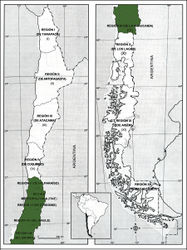Piptochaetium fuscum
| Notice: | This page is derived from the original publication listed below, whose author(s) should always be credited. Further contributors may edit and improve the content of this page and, consequently, need to be credited as well (see page history). Any assessment of factual correctness requires a careful review of the original article as well as of subsequent contributions.
If you are uncertain whether your planned contribution is correct or not, we suggest that you use the associated discussion page instead of editing the page directly. This page should be cited as follows (rationale):
Citation formats to copy and paste
BibTeX: @article{Barkworth2014PhytoKeys35, RIS/ Endnote: TY - JOUR Wikipedia/ Citizendium: <ref name="Barkworth2014PhytoKeys35">{{Citation See also the citation download page at the journal. |
Ordo: Poales
Familia: Poaceae
Genus: Piptochaetium
Name
Piptochaetium fuscum (Nees ex Steud.) Barkworth, Ciald., & Gandhi comb. nov. – Wikispecies link – IPNI link – Pensoft Profile
Basionym
Urachne fusca Nees ex Steud., Syn. Pl. Glumac. 1(2): 123. 1854 [1855 publ. 2–3 Mar 1854]. Lectotypus: K000433539, Herbarium Hookerianum 1867 (http://specimens.kew.org/herbarium/K000433539), imagem videmus; Isolectotypi K000433540, Herbarium Benthianum 1854 (http://specimens.kew.org/herbarium/K000433540), imagem videmus; CGE, Herb. J. Lindley, purchased 1866 (figs 1, 2, 3); “prope Valparaiso, Chili; H. Cuming 453, 1831; Imagines videmus. The three specimens are from the same gathering and conform to the protologue. We chose K000433539 as the lectotype because it has more material, both reproductive and vegetative, than the other specimens. Columbus and Smith (2010)[1] were forced to base their name on Piptochaetium purpuratum Phil. because the name Stipa fusca had already been used for an Australian taxon by Hubbard (1925)[2].
Parodi (1944)[3] stated that Piptochaetium fuscum grew in central Chile, extending from Valparaiso and Santiago to Valdivia. This statement was confirmed by Zuloaga et al. (2008)[4] who added that it grew at 0-800 m. There are only three South American records with latitude and longitude in the Global Biodiversity Information Facility. They were collected at 37.41S, 72.01W [SI 268952]; 36.48S, 72.71W [BAA 416344], and 36.56S, 72.49W [BAA 416345]. Zuloaga et al. (2008)[4] provide information in terms of Chile’s regions (Fig. 2). The species is also known from one locality in Marin County, California, where it was first collected in 1978 (Consortium of California Herbaria 2014[5]). The origin of the population is unknown. It does not appear to have spread since its introduction. To determine the conservation status of Piptochaetium fuscum, a search should be made for specimens in Chilean herbaria and field work conducted to locate natural populations. Such activities were beyond the scope of our study.
Taxon Treatment
- Barkworth, M; Cialdella, A; Gandhi, K; 2014: Piptochaetium fuscum (Nees ex Steud.) Barkworth, Ciald., & Gandhi, a new combination replacing Piptochaetium setosum (Trin.) Arechav. PhytoKeys, 35: 17-22. doi
Other References
- ↑ Columbus J, Smith J (2010) Nomenclatural changes for some grasses in California and the Muhlenbergia clade (Poaceae). Aliso 28: 65-767.
- ↑ Hubbard C (1925) Stipa fusca. In: Decades Kewenses, Plantarum novarum in herbario horti regii conservatorum Decas CXIII. Bulletin of Miscellaneous Information, Kew 1925: 432.
- ↑ Parodi L (1944) Revisión de las gramineas Australes Americanas del genero Piptochaetium. Revista del Museo de la Plata, Bot. 6: 1-310.
- ↑ 4.0 4.1 Zuloaga F, Morrone O, Belgrano M (Eds) (2008) Catálogo de las plantas vasculares del Cono Sur. Vol. 1. Missouri Botanical Garden Press, St. Louis, Missoui, U.S.A.
- ↑ Consortium of California Herbaria. 2014-01-09. Records of Piptochaetium setosum. http://ucjeps.berkeley.edu/consortium/
Images
|
